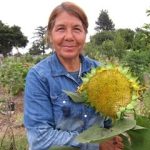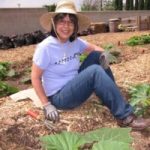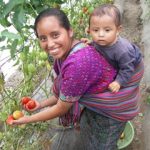Practical Climate Action Training for People, Communities, and the Nonprofits
and Towns That Serve Them
PROVEN, PRACTICAL APPROACH
Get road-tested, affordable, do-it-yourself solutions for a changing climate that you can launch now!
Start today with ‘8 Steps: Cut Your Carbon Footprint 50%.’
How your nonprofit organization can teach urban families to grow healthy food in small spaces.
Launch an urban gardening program for fresh, nutritious vegetables for at-risk urban families.
8 Weeks | Hands-On
An 8-week, self-paced, urban gardening challenge for your nonprofit to get a small, city gardening demonstration up and running!
This course is perfect for nonprofit organizations who want to teach urban families how to grow nutritious, fresh vegetables—healthy food—with an experienced vegetable gardener.
1. If you’re not an experienced vegetable gardener YOU will learn how to plan, plant, and produce vegetables in a city gardening setting.
2. A component of each assignment will also show you how to work with your urban families and teach THEM how to plan, plant, and produce vegetables in their own urban gardening setting.
You will learn about:
This hands-on training course for the staff of food banks, nonprofit organizations, and charities is for actually launching an urban gardening program.
In 8 weeks, you will be guided by an experienced instructor in developing a real-life city gardening project using hands-on exercises and learn how to teach urban families in your community about city gardening too. All they will need for container gardening is a patio, a balcony, a terrace garden, a small garden plot, or a rooftop.
For individuals and families:
You will receive weekly, hands-on assignments designed to get you vegetable gardening in the city in 8 weeks. Your teacher will answer your questions and offer helpful suggestions each week.
For nonprofit organizations and community groups developing urban gardening programs:
We will tailor your experience so that you will have the tools and urban gardening knowledge to teach these practical skills to individuals and families in your community.
Course participants from nonprofit organizations have helped people in North America, Europe, Australia, and Great Britain participate in city gardening programs.
Work in the Global South? If so, this sister course is a better match for you: Village Vegetable Gardens.
How to Grow VegetablesContainer Gardening for Urban Families course resources include:
The instructor-led course will provide one-on-one instruction in tandem with all of the downloadable course materials listed above. Your instructor will offer professional comments and encouragement for each of your assignments.
Certificate: Upon completing the course and all 6 assignments, you will receive a PDF Certificate of Completion.
Take this course with a live teacher. You will have complete access to the downloadable course resources and lessons described below. This course is offered as a live workshop—perfect for staff or community members. Please contact us for more information.
$19.95
Instructor-Taught Online
Ideal for Community Groups and Nonprofits
8 Week Program
After enrolling, you will be sent a welcome email with login instructions.
Last Step: Your next step is to simply fill out the student information sheet to complete your registration.

“Thanks Tim for the awesome set of Week One materials and links. So much to learn and apply.
Just wanted to say thanks for your highlighting our senior friendly garden a few weeks back; some early items are already poking through.
Thanks for the great work you do in supporting courses with a vision to help with nonprofit impact.”
Bob Sutton, Light for Change. Canada, Guatemala, Honduras.
See an example of Bob’s Week One Assignment.
“Thanks Tim!
I have been reading through the resources already and am looking forward to designing my garden for the spring!
Enjoy,”
Sarah Van Vliet. Canada
1. This course is perfect for professionals working for nonprofit organizations or charities in an inner city setting who want to develop practitioner-level skills. If you are a grant writer, nonprofit staff member, consultant, project manager—or an executive director—you will develop real skills mastery.
2. This course is just as relevant to a person considering a career transition into the nonprofit world and wanting to develop employable skills.
How to start your course? Enroll, login, scroll down and click on Welcome Students!
8 Weeks: Develop a real-world urban gardening program.
Week 1. Choosing a space and containers for container gardening for your vegetables.
Week 2. Nutrition, planning, and selecting seeds for vegetables. Start some seeds in seed trays now.
Free Week. If you need to, this is a good time to catch up.
Week 3. Gardening in containers. What kind of potting soil? Where to get it?
Week 4. Prepare the potting soil for container gardening for optimal plant growth-organically.
Week 5. Plant seeds and also seedlings in your new garden containers & plant pots.
Free Week. If you need to, this is a good time to catch up.
Week 6. Learn how to gauge sun and water.
Week 7. Practice insect vigilance: organically.
Week 8. Planning and cooking nutritious meals using your healthy food.
I began teaching this course a dozen years ago because I wanted to share my love of city gardening—and to help families be able to enjoy healthy food. This is especially important in the Global South, and for low-income and inner city families in the Global North.
I started young. When I was 13, I got a job in a commercial greenhouse and then worked at a botanic garden during high school.
At university, when I got my first little house with a postage-stamp urban garden, I planted my first vegetables. I’ll never forget the magic and the thrill of watching those little seeds turn into mature plants that we could use in our meals.
After University, I began urban farming in earnest in my backyard when this wasn’t a common thing to do in a city! Slowly I met a few other kindred souls. We wanted to spread the urban farming word and so we launched an organization called the Tilth Urban Agricultural Center right in the middle of Seattle Washington. It’s been going strong now for 40 years and has grown tremendously—beyond our wildest dreams.
Just for Fun
When I began teaching this series of vegetable gardening courses over 12 years ago, here at the Center for Sustainable Development, I was very excited to share what I knew and my enjoyment of urban gardening.
So I wrote this first course description then, in 2010, which might be fun for you to scan because it tells a lot about me, about how I approach city gardening and the things that I particularly enjoy. There are photos of my urban garden.
It will also give you an in-depth look at the course that you are about to take. This course is designed to be fun!
Enjoy!
Sincerely, Tim Magee
Please contact us with questions.

How to Grow Vegetables
8 Week Class
Hands On

Nonprofit Community Food Gardens
8 Week Class
Hands On

Nonprofit Care of Food Gardens
8 Week Class
Hands On

Village Vegetable Gardens
8 Week Class
Hands On

Climate Smart Agricultural Program
8 Week Class
Hands On
This is course is the first part of a four-course program on planning, funding, launching, and managing a local climate action plan for your community. The course will lead you through the design and launch of a similar, real project in your local community.
In this first course, you will work hand-in-hand with community members in developing a local climate action plan.
By the end of the 8 weeks, you will have designed a plan complete with climate change solutions that will work for your community’s climate change challenges. Your plan is in preparation for the second course of the program where you will develop a full set of donor documents to present for funding.
Course Syllabus
8 Weeks: Develop a real-life, local climate action plan.
Week 1. Complete enrollment, meet your teacher, and explore the course resources. You will then have the next 3 weeks for Assignment One.
Week 2 & 3. Conduct a climate change conversation with community members to understand their needs, personal interests—and strengths!
Week 4. Clearly define your community and its overall climate challenges.
Week 5. Learn how to solve the challenge using locally-focused climate change solutions.
Week 6. Make sure your plan will work by checking that your climate solutions have success stories that show a proven track record.
Week 7. Assemble a detailed outline for a local climate action plan in preparation for a donor presentation.
Week 8. Share your project with your community and with a donor for feedback.
Where?
Types of communities that you can help prepare for their climate challenges during your participation in this course:
The importance of community members. Every community has different climate challenges: location and size make each community unique. Designing solutions to climate challenges will need to be on a very local, human scale. Top-down plans won’t work.
Consequently, the most important people in designing, launching and maintaining climate action plans are the community members themselves. They know their unique climate challenges, they know potential solutions, and they know what they want for their community. They will become the owners of the plan.
8 Weeks | Course 1 of 4 | Hands-On
This is the first course of four-courses on planning, funding, launching, and managing a climate action plan with your community.
You will work hand-in-hand with community members in developing their plan.
The program is designed to help both experienced—and novice—climate change planners implement bold climate action plans for ensuring that communities are prepared for a changing climate.
Course Objective
In designing a successful climate action plan you will:
Course Outcomes
Learn by doing. This climate change program is for actually launching a climate change action plan with a real community. In 8 weeks you will design a plan complete with solutions for your community’s climate change challenges.
This is in preparation for the second course of the program where you will develop a full set of donor documents to present for funding.
Course participants have helped communities in North America, Europe, Australia, and Great Britain be prepared for local challenges magnified by global warming:
The course will lead you through the design and launch of a similar, real project in your local community.
CSDi’s Climate Solutions Newsletter
Positive, practical news, ideas & actions to combat global warming.
Learn to design solutions for a community’s climate change challenges.